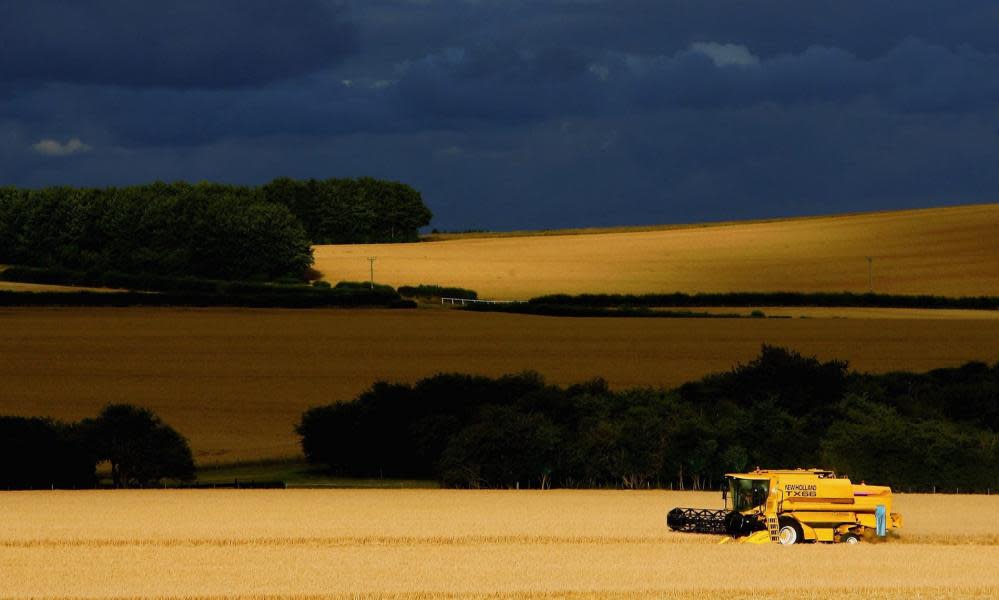Revealed: majority of politicians on key EU farming panel have industry links

Most of the politicians on the European parliament’s influential agriculture committee have business or personal links to the farming sector they are charged with regulating, research reveals.
The key EU panel oversees some of the most important agricultural decisions in European politics. Its MEPs negotiated the last common agricultural policy (CAP) settlement with 28 nation states and the European commission. The CAP sets subsidy rates for farmers across the continent – accounting for almost 40% of the EU’s overall budget in 2017, or €59bn (£51.5bn).
The panel is likely to negotiate the EU’s 2020-27 CAP budget under a new proposal the commission will present on 1 June.
But new research shows that 25 of the committee’s 45 members are either farmers, former farmers, CAP payment recipients in another capacity, current or former partners in agricultural businesses, or have spouses who own farms. Another four have looser ties to the sector, such as having close family who are farmers.
The Liberal Democrat MEP Catherine Bearder said that lawmakers with conflicts of interest should stand down in future votes.
She told the Guardian: “Every committee needs expertise and experience. That’s very important to parliament’s work. But in doing that work, MEPs must follow the parliament’s code of conduct which states that they carry out their duties with disinterest, integrity, openness and diligence. Any office holder that has a vested interest in a certain policy should excuse themselves by declining to vote or abstaining.”
British MEPs on the committee with declarations listing agribusiness links include: Richard Ashworth (Independent Conservative) who earns €1,000-€5,000 per month for his farm and between €5,000-€10,000 per month for his chairmanship of United Milk PLC and former chair of NFU Corporate; John Stuart Agnew (Ukip), who receives between €1,000-€5,000 a month for his Norfolk farm, and Jim Nicholson (Ulster Unionist party), the part-owner of a farm in Armagh.
Nicholson said: “Expertise and firsthand experience [are] important for policy development. Having been involved in previous rounds of CAP reforms I have seen firsthand how many of the initial proposals were unworkable and didn’t recognise the practical realities of farming. Input from MEPs with some knowledge and experience of agriculture helped to improve the final package.”
John Capone, a spokesman for Richard Ashworth, told the Guardian that he “hasn’t earned a penny from the farming business for near on 20 years so the declaration needs to be updated.” However, in his most recent declaration of interests, filed last summer, his farming and industry incomes were stated to be between €6,000-€16,000 per month.
Ashworth resigned the Tory whip over Brexit and now sits with the European People’s party group in parliament. Capone said that as an MEP from a departing country, he refuses to vote on future agricultural issues for ethical reasons.
A spokesman for Agnew said: “Before he was elected, he made very clear that as a farmer he was very interested in defending British farmers’ interests. As long as one declares one’s interests, then having some expertise is probably a good thing, isn’t it?”
However, some EU figures are concerned that the outcome of the EU’s CAP review could be steered by lawmakers with an interest in maintaining the status quo.
Under the presidency of José Manuel Barroso earlier this decade, the committee’s MEPs are said to have blocked a commission proposal to put a maximum cap on farm subsidies.
One senior source who has negotiated past “trilogues” – three-way legislative mediation between the EU’s parliament, commission and 28 member states – described the committee as “a powerful lobby for farmers”.
He said: “It definitely looks to be a problem that the people who decide on the attribution of finances benefit from them directly and have such an important voice in the decision making process.”
In past negotiations, agri MEPs had “vastly reduced modifying commission proposals in the direction of maintaining a system that provides the maximum financial support to the 20% of large farms which receive 80% of the subsidies,” the source explained.
“My expectation [in the current CAP review] is that any serious change there would be solidly resisted by parliament,” he added.
The distribution of CAP funds has become increasingly controversial after a collapse in small farms this decade that has seen 26% of all freeholds close between 2005 and 2013. Critics say that the CAP’s structure also encourages factory farming and environmentally damaging practices.
One recent investigation found that a majority of farms surveyed in seven EU countries received €104m of CAP direct payments in 2017, despite being their nations’ highest emitters of ammonia.
Greenpeace, which collated the new MEPs’ data from publicly available sources, said that farmers’ input was vital for reforming EU policy, but that an imbalanced committee risked public health.
Marco Contiero, Greenpeace EU’s agriculture policy director, told the Guardian: “With an absolute majority, the interests of the farming industry can be imposed on all the other sectors of society. That’s why it is essential that the CAP reform is decided by a wider set of decision-makers, including those coming from the health, climate and environmental sectors.”

 Yahoo News
Yahoo News 
